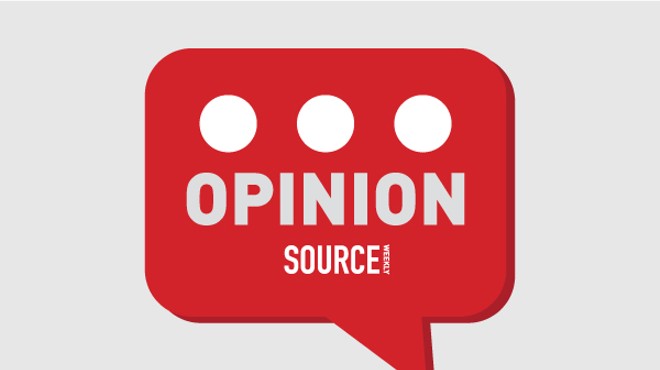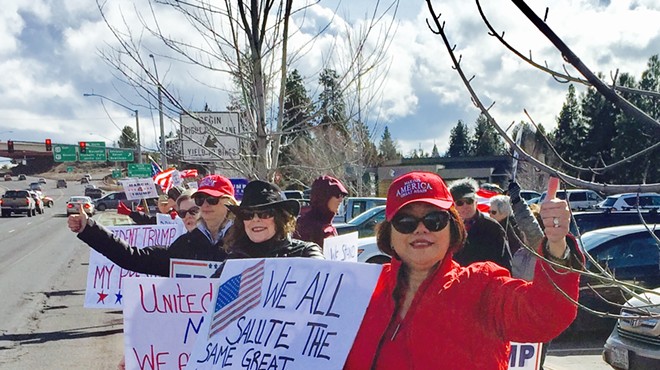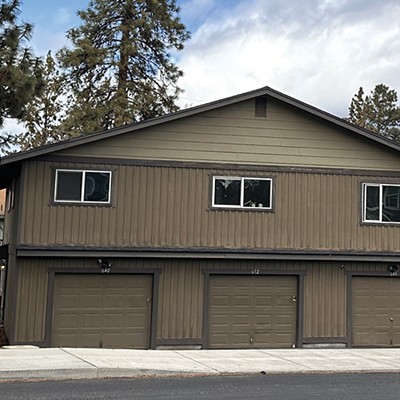The 129,200 people in Walden's district who got covered under the ACA's Medicaid expansion, for one...
If you've been in Oregon for more than a few minutes, you've probably gotten a hint of the "better before you came" mentality that tends to pervade any conversation about incoming Californians... or anyone from out of area, for that matter. There are those who don't mind the growth and the influx of people, and those who are squarely against all change.
With the introduction of the new American Health Care Act, aka Trumpcare—rolled out for public view Monday—it seems that trend continues. Under Trumpcare, refundable tax credits will be available to people based on age and income, which can be used to pay for health care premiums. The ACA's protections for people with pre-existing conditions remain—but under Trumpcare, insurers can impose a 30 percent surcharge per year on people whose coverage has lapsed. Under Trumpcare, the taxes imposed on the wealthy are gone—as are the taxes on the insurers and the manufacturers of prescription drugs. Insurance companies can offer a wider range of policy options—something supporters tout as "more flexibility"—but at the same time, carriers will be allowed to pay for less of the bill.
As for the 400,000 Oregonians who found themselves able to get insurance due to the expansion of Medicaid (part of the Oregon Health Plan), you, friends, get to experience the power of "better before you came" first-hand. Under Trumpcare, those who are enrolled before 2020 will stay enrolled. "None of those people will have the rug pulled out from under them," Andrew Malcolm, deputy chief of staff for Rep. Greg Walden (R), told the Source Weekly. Walden is the chairman of the House Committee on Energy and Commerce, the committee responsible for the rollout of Trumpcare.
At first blush, that might all seem OK. Low-income Americans can simply sign up before 2020 and they'll be OK. Those already on the plan can stay enrolled for the rest of their lives—that is, unless life changes, as it often does among low-income people. People move for economic reasons, for example. They take on new jobs or leave them.
"The idea is that those people will get a job," said Malcolm, and then get covered through their employer. But when that low-income worker loses his job again, what are the options? Since the Trumpcare plan rolls back the amount of contribution by the federal government to pre-ACA levels, the burden to pay for the difference goes back to the state—that is, if the state chooses to go that route. Even before these changes, Oregon was facing a shortfall in funding its portion of the Medicaid/Oregon Health Plan programs. Where's that money going to come from now?
"This bill sends a loud and clear message: tax cuts for special interests and the wealthy matter more than your health care," remarked Sen. Ron Wyden Monday. "The American people will pay more and get less or no coverage at all—it ends Medicaid as we know it, it decimates state and family budgets while putting America's most vulnerable at risk, it puts the government between women and their doctors, and it steals money from Medicare to give a massive tax break to the wealthy," Wyden said.
Meanwhile, Gov. Kate Brown has proposed increasing the tax on hospital revenues—which have seen sharp increases since the advent of the ACA—and on managed care organizations and health insurance premiums. Those are lofty goals, but the bottom line is, Greg Walden's constituents have benefitted immensely from the expansion of Medicaid under the ACA, by having access to coverage. Central Oregon's economy continues to grow, and that could mean continued job growth, but it will also mean a growth in our population. Some will come for jobs. Some of those jobs will be living-wage ones that offer insurance. Some will be in restaurants, ski resorts and other tourism-related companies that don't offer coverage. Others will come because they have family or friends here on whom they can lean. All of those people deserve coverage.
Today, the Oregon Health Plan provides health insurance to one in four Oregonians—the Oregonians who struggle to pay the bills and to get the care they need to be contributing members of society. Do we want to continue supporting that population, or do we want to continue this "better before you came" game that already divides our communities?
Who knew health care could be so complicated? The poor of Central Oregon, that's who.






















